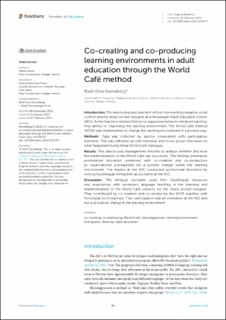| dc.contributor.author | Ravneberg, Bodil Elise | |
| dc.date.accessioned | 2024-04-15T07:34:25Z | |
| dc.date.available | 2024-04-15T07:34:25Z | |
| dc.date.created | 2024-02-01T12:59:43Z | |
| dc.date.issued | 2024 | |
| dc.identifier.issn | 2504-284X | |
| dc.identifier.uri | https://hdl.handle.net/11250/3126418 | |
| dc.description.abstract | Introduction: This article analyzes teachers’ efforts in preventing negative social control among newly arrived refugees at a Norwegian Adult Education Center (AEC). As the teachers realized that micro aggressive behavior hindered learning, they aimed for improving the learning environment. The World Café method (WCM) was implemented to change the learning environment in a positive way.
Methods: Data was collected by passive observation with participatory elements. This was followed up with individual and focus-group interviews on what happened during three World Café dialogues.
Results: This article uses management theories to analyse whether and how the implementation of the World Café was successful. The findings emphasize professional discretion combined with co-creation and co-production as organizational prerequisites for a positive change within the learning environment. The leaders at the AEC conducted professional discretion by employing bilingual immigrants as assistants at the AEC.
Discussion: The bilingual assistants used their multilingual resources and experiences with secondary language teaching in the planning and implementation of the World Café sessions for the newly arrived refugees. They contributed by co-creation and co-producing the WCM together with Norwegian born teachers. Their participation was an innovation at the AEC and led to a positive change in the learning environment. | en_US |
| dc.language.iso | eng | en_US |
| dc.publisher | Frontiers | en_US |
| dc.rights | Navngivelse 4.0 Internasjonal | * |
| dc.rights.uri | http://creativecommons.org/licenses/by/4.0/deed.no | * |
| dc.title | Co-creating and co-producing learning environments in adult education through the World Café method | en_US |
| dc.type | Peer reviewed | en_US |
| dc.type | Journal article | en_US |
| dc.description.version | publishedVersion | en_US |
| dc.rights.holder | © 2024 Ravneberg | en_US |
| dc.source.pagenumber | 7 | en_US |
| dc.source.volume | 9 | en_US |
| dc.source.journal | Frontiers in Education | en_US |
| dc.identifier.doi | 10.3389/feduc.2024.1335747 | |
| dc.identifier.cristin | 2241861 | |
| dc.source.articlenumber | 1335747 | en_US |
| cristin.ispublished | true | |
| cristin.fulltext | original | |
| cristin.qualitycode | 1 | |

